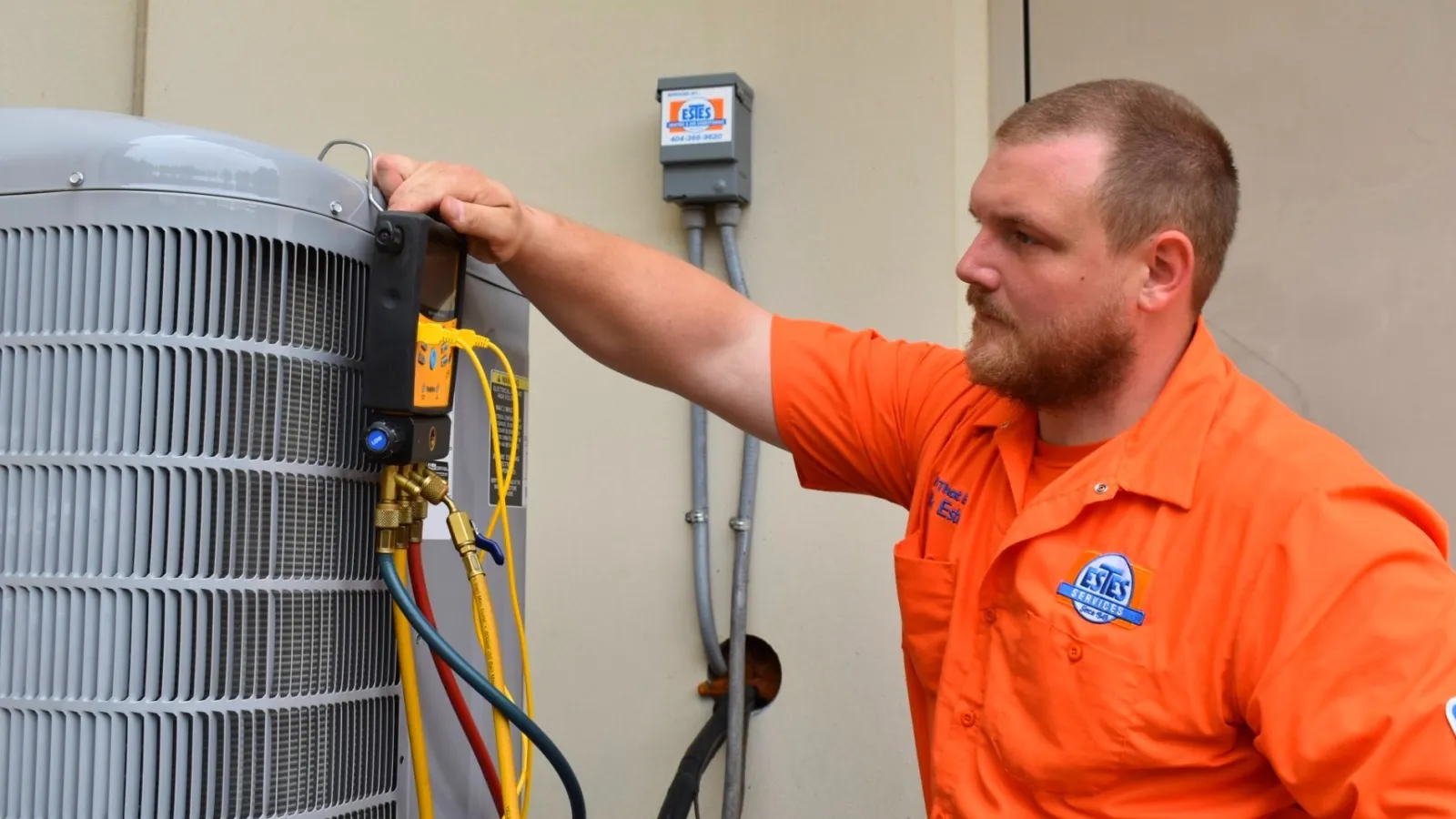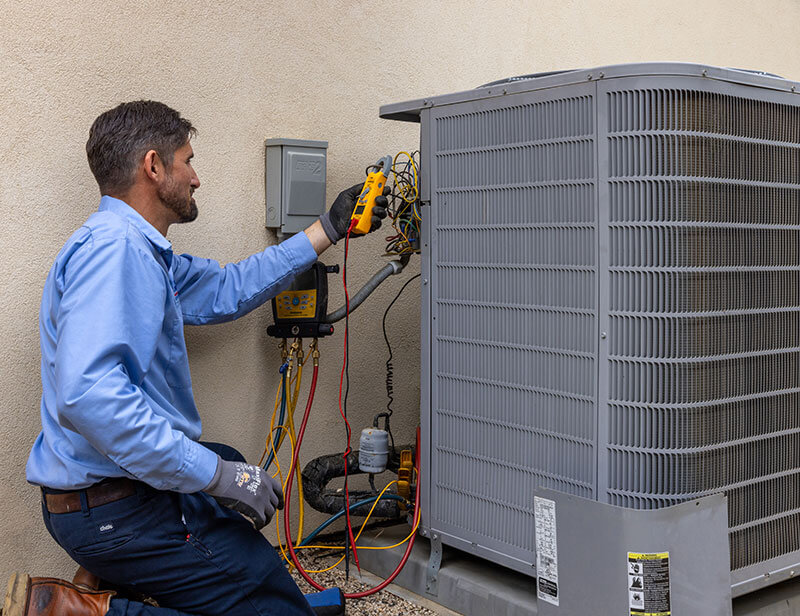Why ductless mini splits Outperform Traditional HVAC Systems
Wiki Article
Picking In Between a Heatpump and Furnace: Secret Considerations for Your A/c Demands
When reviewing heating options for HVAC needs, the decision in between a warm pump and a furnace can be intricate. Each system supplies distinctive benefits tailored to specific climates and energy efficiency goals. Understanding these distinctions is essential for making an enlightened selection. Secret factors such as setup expenses and environmental effect additionally complicate the option process. Which alternative genuinely aligns with one's convenience and sustainability choices? The following sections will certainly discover these considerations carefully.Recognizing Warm Pumps: How They Function and Their Benefits
While lots of home owners consider various home heating options, understanding just how heat pumps feature and their advantages can greatly affect their choice. Heatpump run by transferring warm as opposed to generating it. In the wintertime, they draw out warmth from the outdoors air or ground and move it inside, while in the summer, they reverse this procedure, cooling down the home by removing warm outside. This twin performance makes them versatile for year-round climate control.One of the key benefits of heatpump is their energy efficiency. They make use of considerably much less electricity contrasted to traditional furnace, potentially causing lower utility bills (heat pump service). In addition, warmth pumps have a smaller carbon impact, making them an eco friendly option. They additionally call for much less upkeep than standard systems, adding to long-lasting price savings. On the whole, understanding the mechanics and advantages of heatpump can aid home owners make informed decisions regarding their heating and cooling needsExploring Furnaces: Kinds, Procedure, and Benefits
Furnaces come in different kinds, including gas, electric, and oil models, each with distinct functional systems. Understanding these differences is crucial, as they influence effectiveness and heating performance. Additionally, heating systems use many benefits, such as regular warmth result and dependability in cooler environments.Sorts of Heating systems
Heating unit can differ substantially in design and procedure, with heating systems being a prominent choice among homeowners. There are numerous sorts of heaters, each using different fuel resources and innovations. Gas heating systems prevail, leveraging gas to generate warm effectively. Electric furnaces, on the various other hand, utilize electrical resistance to produce warmth, typically preferred for their uncomplicated installment. Oil heating systems, while less typical, are efficient in areas with minimal gas gain access to (heat pump replacement ooltewah tn). Additionally, condensing heaters make best use of energy efficiency by recycling and catching exhaust gases. Each kind operates through a system of warm exchangers and ductwork to distribute warm air throughout a home. Understanding the differences between these heater types is vital for educated a/c choicesAdvantages of Furnaces
For house owners seeking reliable warmth during cool months, the advantages of heating systems are substantial. Heating systems give consistent heating, making sure also temperature levels throughout the home. They are particularly effective in extreme chilly, usually exceeding heatpump in frigid conditions. Various types, including gas, electric, and oil heating systems, use adaptability to satisfy diverse requirements and preferences.Furnaces additionally tend to have lower preliminary installation expenses contrasted to warmth pumps, making them a much more obtainable option for many. Their robust design adds to a longer life expectancy, with several devices lasting over 15 years with correct upkeep. In addition, modern furnaces are often geared up with advanced technology for improved performance, which can cause minimized power costs. On the whole, heaters continue to be a trustworthy selection for efficient home heating.
Power Effectiveness: Contrasting Warm Pumps and Furnaces
When contrasting power effectiveness between heat pumps and heaters, the Seasonal Energy Effectiveness Ratio (SEER) plays a necessary role in figuring out efficiency. Additionally, an operational cost evaluation discloses the long-term financial ramifications of each system. Recognizing these factors can direct property owners in making notified decisions about their home heating solutions.Seasonal Energy Efficiency Ratio
Energy effectiveness plays an essential function in the decision-making procedure in between heatpump and heaters, particularly when considering the Seasonal Energy Efficiency Ratio (SEER) This metric procedures the cooling efficiency of warm pumps over an entire cooling season, supplying a standard method to examine efficiency. Greater SEER scores suggest higher energy effectiveness, equating to reduced energy usage and minimized energy costs. In comparison, heating systems are typically assessed using the Yearly Fuel Utilization Performance (AFUE) ranking, which reflects heating performance. When comparing these two systems, homeowners should focus on SEER rankings for heatpump, as they directly effect general energy financial savings and ecological sustainability. A detailed understanding of SEER can especially influence the long-term complete satisfaction and cost-effectiveness of the selected HVAC remedy.Functional Price Analysis
Recognizing the operational prices connected with warm pumps and heaters is vital for property owners assessing their choices. Warmth pumps commonly use higher power effectiveness, converting electrical energy right into warm with marginal waste. This causes lower month-to-month utility bills, specifically in moderate environments. On the other hand, conventional heaters, especially gas models, may have lower upfront prices but can sustain greater operational expenditures in time as a result of fuel prices and effectiveness ratings.Moreover, heat pumps can function as both home heating and cooling systems, potentially reducing the demand for separate a/c units. While first investments for heatpump might be higher, their long-lasting financial savings in power efficiency can make them an extra economical option for several households. Careful analysis of neighborhood power rates is important to identify the most effective alternative.Installment Costs: What to Expect for every Heater
Setup costs for heater can vary significantly in between warm pumps and furnaces, affecting homeowners' decisions. Heatpump generally have higher in advance installation expenses, typically ranging from $3,500 to $8,000, depending upon the system dimension and intricacy of setup. This includes the outdoor system, interior handling system, and essential ductwork alterations. Conversely, heating systems often tend to have reduced preliminary expenses, balancing in between $2,500 and $6,000, which can be appealing for budget-conscious home owners. Installment expenditures can enhance if substantial ductwork is required.Moreover, the choice of fuel kind for furnaces-- all-natural gas, gas, or electric-- can also influence installation costs. While heatpump use power performance, their initial investment might prevent some purchasers. Inevitably, reviewing setup costs alongside lasting cost savings and performance will assist home owners in making informed choices regarding their furnace.Environment Considerations: Which System Executes Better in Your Location
Exactly how do environment problems influence the performance of home heating systems? The performance of warm pumps and heating systems can vary considerably depending on the regional environment. In modest climates, warm pumps excel by successfully transferring warm from the outdoors air, making them an energy-saving choice. Their effectiveness diminishes in very cool temperature levels, where they may battle to remove enough warmth. Conversely, furnaces, particularly gas designs, give reliable and constant heat regardless of outdoor conditions, making them preferable in cooler regions.In areas that experience milder winter seasons, warm pumps can run effectively year-round, offering both cooling and heating. On the other hand, regions with harsh winter seasons typically benefit from the robustness of furnaces. Eventually, recognizing the neighborhood environment is crucial when determining in between a heatpump and a heater, as it directly impacts their operational effectiveness and total efficiency.Maintenance Requirements: Long-Term Treatment for Warm Pumps vs. Furnaces
While both warm pumps and heating systems require regular maintenance to assure peak performance, their particular needs and treatment routines differ significantly. Furnaces normally need less regular focus, with annual assessments sufficing to look for gas leaks, tidy over here filters, and analyze general functionality. Their less complex layout commonly allows for uncomplicated repairs.In comparison, heatpump demand biannual maintenance due to their twin role in home heating and air conditioning. This includes cleansing coils, checking refrigerant degrees, and making sure that both the exterior and interior units work at their finest. Additionally, heatpump maintenance frequently includes more elaborate components, making expert maintenance essential.Neglecting upkeep can result in lessened efficiency and boosted energy costs for both systems. Eventually, homeowners should take into consideration these long-term care requirements when picking between a heatpump and a furnace, as positive upkeep can expand the lifespan and efficiency of either system significantly.Ecological Influence: Choosing a Sustainable Heating Alternative
The ecological impact of heater is an essential examination for property owners looking for lasting alternatives. Warm pumps are usually more energy-efficient than conventional heating systems, as they move heat as opposed to generate it, substantially reducing carbon emissions. By utilizing renewable resource resources, such as air-source or geothermal heatpump, homeowners can additionally minimize their environmental footprint.On the other hand, gas heating systems release greenhouse gases and add to air contamination, though they often provide greater heat outcome. Advancements in technology have actually led to the advancement of high-efficiency heaters that minimize emissions.Ultimately, selecting a home heating system entails evaluating effectiveness versus environmental impact. House owners are encouraged to assess regional energy sources and rewards for renewable systems, guaranteeing a selection that lines up with both personal convenience and ecological obligation. The choice affects not only prompt comfort but likewise long-term sustainability and ecological health.Often Asked Inquiries
The Length Of Time Do Warmth Pumps and Furnaces Commonly Last?
The life expectancy of heatpump normally varies from 15 to twenty years, while furnaces can last between 15 to three decades. Regular upkeep substantially affects their longevity and performance in offering home heating remedies.Can I Utilize a Warm Pump in Exceptionally Cold Climates?
Heatpump can operate in very cool climates, yet their effectiveness reduces as temperatures drop. In such conditions, supplementary home heating sources may be required to keep comfy interior temperatures and ensure peak efficiency.
What Is the Noise Degree of Heat Pumps Versus Furnaces?
The sound levels of heatpump and heating systems vary significantly. Typically, heat pumps run even more quietly than traditional heaters, making them better for those delicate to sound, while heaters might generate louder operational sounds during heating cycles.
Are Heat Pumps Suitable for Both Heating & Cooling?
Heatpump are without a doubt appropriate for both cooling and heating (furnace replacement). They operate by moving warm, providing reliable temperature control click over here year-round, making them a functional choice for house owners looking for an all-in-one HVAC remedyWhat Size Heating System Do I Required for My Home?
Determining the proper dimension furnace for a home requires reviewing factors such as square video footage, insulation top quality, local environment, navigate to these guys and the home's format. Consulting a specialist can ensure an exact analysis and perfect comfort. Warmth pumps usually supply greater energy efficiency, transforming electric energy right into warmth with very little waste. In modest climates, warm pumps succeed by efficiently moving heat from the outside air, making them an energy-saving choice. Alternatively, heaters, particularly gas versions, supply constant and reputable warm regardless of exterior conditions, making them preferable in colder regions.In areas that experience milder winters, warmth pumps can operate properly year-round, giving both heating and cooling. Warmth pumps are generally more energy-efficient than standard heating systems, as they transfer heat rather than generate it, significantly decreasing carbon exhausts. By utilizing renewable power resources, such as geothermal or air-source warm pumps, house owners can additionally minimize their environmental footprint.On the various other hand, all-natural gas heating systems emit greenhouse gases and contribute to air pollution, though they frequently provide greater heat output.Report this wiki page